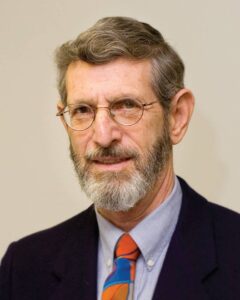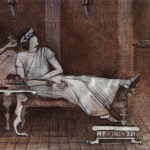Richard S. Panush, MD, Recipient of 2022 AAIM-APDIM Distinguished Medical Educator Award
During Academic Internal Medicine Week 2022, sponsored by the Alliance for Academic Internal Medicine (AAIM), April 10–13, Richard S. Panush, MD, MACP, MACR, received the Distinguished Medical Educator Award from the Association of Program Directors in Internal Medicine. Dr. Panush is a professor of medicine emeritus, Division of Rheumatology, Keck School of Medicine at the University of Southern California, Los Angeles.
As early as his third year of medical school at the University of Michigan, Ann Arbor, Dr. Panush found that rheumatology “posed some of the most interesting and challenging clinical and investigative questions in medicine.” His influences included the late Giles Bole, MD, a former dean of the medical school and past president of the ACR; the late C. William Castor, MD; the late James B. Wyngaarden, MD, who was the residency chair at Duke University, Durham, N.C., during Dr. Panush’s time there, and subsequently director of the National Institutes of Health (NIH); and William N. Kelley, MD, MACP, “when he had just come to Duke as this a bright young rheumatologist from the NIH.” Dr. Kelley is another ACR past president and current professor of medicine at the University of Pennsylvania.

Dr. Panush
Dr. Panush cites other important influences from his rheumatology fellowship at the Robert Breck and Peter Bent Brigham Hospitals (now known as the Brigham and Women’s Hospital, Boston): Peter H. Schur, MD, professor of medicine, Brigham and Women’s Hospital, and K. Frank Austen, MD, the AstraZeneca Professor of Respiratory and Inflammatory Diseases at Harvard Medical School.
Dr. Panush’s multi-faceted career has included academic appointments at the University of Florida College of Medicine, Gainesville; Saint Barnabas Medical Center, Livingston, N.J.; University of Medicine and Dentistry, New Jersey Medical School, Newark; and Mount Sinai School of Medicine, N.Y.
Throughout his career Dr. Panush has maintained a passionate interest in the interface of medicine with the humanities; he has studied and written extensively about this. As the chair of the ACR’s Ethics Committee, Dr. Panush played a critical role in helping identify Nazi physicians who had been recognized with eponymic honors and having their names removed from the diseases with which they had been associated. They should be remembered “in obloquy and shame for their violation of transcendent ethical and moral responsibilities,” he says.
Dr. Panush was a residency or fellowship program director for 40 of his 50 years in academic medicine, and division chief or department chair for 35. “At some point in your career, you realize it’s not about you,” he says. “It’s about the program you’re in, and the organization and community you represent. What’s important is how you influence others, how you support them in their careers and how you try to make people, programs, rheumatology and our world better.”


